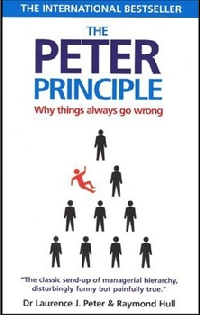BRYCE ON MANAGEMENT
- It is universally applicable to any line of work.
To use this segment in a Radio broadcast or Podcast, send TIM a request.

When I got into the work force back in the mid-1970's it seemed everyone dressed in a suit and tie, drank black coffee, smoked their brains out, and worked their butts off. Today, golf shirts have replaced suits, herbal tea and bottled water have replaced coffee, nobody is allowed to smoke, and rarely does anyone work beyond 5:00pm. More importantly, we used to care about the work we produced; there was a sense of craftsmanship, regardless of the job.
My Brother-in-law in Cincinnati conducted me on a tour of his company's machine-tool shop years ago and showed me how he could take a block of aluminum and convert it into a high-precision machine tool. It was a pleasure to watch him work, as it is to watch anyone who knows what they are doing, be it a waitress, a programmer, a laborer or a clerk.
Quality and service used to be considered paramount in this country. If it wasn't just right, you were expected to do it over again until you got it right. We cared about what we produced because it was a reflection of our personal character and integrity. But somewhere along the line we lost our way and craftsmanship has fallen by the wayside. Why? Probably because we no longer care.
In today's litigious society, employees are acutely aware that it is difficult to be fired due to poor performance. They know they will still get paid and receive benefits, regardless of the amount of effort they put forth. Consequently, there is little to encourage people to perform better. Money isn't a motivating factor anymore. People now expect bonuses, raises and other perks to be paid out regardless of how well they perform during the year.
We've also become a nation content with doing small things. America used to be known as a powerhouse that could tackle large projects, such as building skyscrapers, designing innovative bridges and tunnels spanning substantial bodies of water, engineering transcontinental railroads and highway systems, conquering air and space travel, and defending freedom not just once but in two world wars. If you really wanted something done, you talked to the Americans and no one else. Now we get excited over iPods, cell phones, and other electronic trinkets.
Many believe Craftsmanship is in decline due to the general apathy found in today's society. Maybe. I tend to believe it is due to an erosion of our moral values. Let me give you an example. Having a child in college, my interest was piqued recently by an article describing the pervasiveness of cheating and plagiarism in our schools. It is not my intent to make a political statement here but many of the students mentioned in the article rationalized their cheating on the fact that one of our past Presidents cheated and lied under oath, and got away with it. They figured if it is okay for the Commander-in-Chief to act this way, it was an acceptable form of behavior.
Arnold Toynbee, the famed English historian, observed, "Civilizations die from suicide, not by murder." If the moral fabric of our society dies, our story is told as evidenced by other great civilizations that long preceded us. Our perspective needs to be realigned: Our personal and professional lives must be viewed as one. As Toynbee remarked, "The supreme accomplishment is to blur the line between work and play." By doing so, we identify more closely with our work and assume a greater pride in workmanship. We do not need to hear this from our boss, but rather from within. As strange as it may sound, I see Craftsmanship as being patriotic in nature; doing a good quality job is part of leading a good and honorable life and builds on the individual's esteem, the company he works for, and the country he lives in.
The biggest problem though is that we have forgotten how to manage people. The manager's primary goal is to create the proper work environment for employees to produce the desired work products. This is different than a supervisory capacity that directs how each person performs the various tasks of a job. In fact, I encourage managers to manage more and supervise less. I cringe when I see a manager try to "micromanage" either a Fortune 500 company or a non-profit organization. Yes, people need to be trained in order to properly perform their work but following this, employees should be mature enough to supervise themselves. In the old days, management stressed discipline, accountability, and structure; three ugly words in today's workplace.
Understanding Craftsmanship
Some might say craftsmanship is a simple concept that we should intuitively know. Not true; most people today have no comprehension as to what makes up a good craftsman; they have either forgotten or it has simply passed them by. Craftsmanship can be found in any field of endeavor imaginable, be it in the product sector or service industry. Craftsmanship, therefore, is universally applicable to any line of work.
Craftsmanship is not "workmanship", nor is it synonymous with quality, although the three concepts are closely related. Let's begin by giving "Craftsmanship" a definition: "The production and delivery of quality goods or services from highly skilled workmen."
Quality relates to the absence of errors or defects in the finished product or service. In other words, finished goods operate according to their specifications (customers get precisely what they ordered). Such products are normally durable and require minimal maintenance. Craftsmanship produces quality products. In the absence of craftsmen, a rigorous methodology or assembly line process is required to produce quality goods using workers without the expertise of craftsmen. Such processes detail "Who" is to perform "What" work, "When", "Where", "Why" and "How" (5W+H), thereby assuring a quality product or service is produced. Such is the underlying rationale of the ISO 9000 certification as used by many companies today. The point is, quality is not the exclusive domain of the craftsman.
Craftsmanship is also a human trait. Some might argue a computer or industrial robot can produce quality products and are, therefore, craftsmen. However, we must remember these devices are programmed by human beings in accordance with the rules of the craftsman. As such, they are an extension or tool of the craftsman.
Craftsmanship can be found in either the overall work process or a section of it. For example, there are craftsmen who are intimate with all facets of building furniture, such as a table, a chair or desk, and can implement the product from start to finish. However, as products grow in complexity, it becomes difficult to find people suitably qualified to build them from the womb to the tomb. Consider military weapons alone, such as the complicated ships, tanks, and airplanes we now use, with thousands or millions of parts to assemble. Such complexity makes it impossible for a single person to have the expertise to build the whole product. The same is true in the service sector where different types of expertise and capabilities may be required. In other words, craftsmen have a specific scope of work. The scope of work may relate to other types of craftsmen through a chain of work dependencies, e.g., Craftsmen A, B and C concentrate on separate sub-assemblies which are eventually joined into a single product.
Attributes
So, what are the attributes of a craftsman? What makes a craftsman a craftsman? There are three basic attributes described herein:
1. Possesses the necessary knowledge and skills to perform the work.
The craftsman is an expert in his field of endeavor; so much so that he could easily serve as an instructor in the subject matter. But the craftsman is also smart enough to know that education is not a one time thing, that his world and field evolve as new tools and techniques are introduced. As such, the craftsman is a student of his profession and is constantly looking to improve himself. This is exercised through such things as continued education, routine certification, studying books and trade publications, and industrial groups. The craftsman willingly participates in trade groups, often at his own expense, in order to network with his peers.
It is Important to note that the craftsman does not need to be told he needs periodic training to sharpen his skills. Instead, he takes the personal initiative to stay on top of his game. Further, the craftsman has no problem with a periodic job review; in fact, he welcomes it for it might bring out a weakness in a skill he needs to sharpen.
2. Attention to detail.
The craftsman understands and respects the process of building/delivering a product or service and is acutely aware of the penalties for cutting corners. Earlier we discussed the need for a methodology that specifies 5W+H. The craftsman is intimate with all details of his scope of work, so much so, he could probably write the methodology himself. Further, his intimacy of the work process means he can produce a reliable estimate of time and costs to perform the work.
Although many of the craftsman's tasks may be repetitive, it doesn't mean he easily falls into a rut. Instead, he is constantly looking for new tools and techniques to improve the work process. As such, he plays the role of Industrial Engineer who is normally charged with such a task.
The craftsman's attention to detail also means that he demonstrates patience in his work effort. Again, wary of cutting corners, the craftsman must possess such patience in order to produce the product the right way.
3. Views professional life as an extension of his personal life.
The craftsman identifies with the end product which is where pride in workmanship comes from. In his mind, the craftsman has been charged with the responsibility of producing something, and wanting to satisfy the customer, puts forth his best effort to produce it. In other words, craftsmen take their work personally. This is a difficult trait to teach particularly in today's society where the focus is more on financial compensation than on the work product itself. It may sound naive, but the craftsman believes he will be suitably compensated for producing superior results.
Years ago, Dick Butkus of the Chicago Bears (NFL) confounded sports writers who could never understand why Butkus played as hard as he did year after year for a losing football team. True, Dick loved the game, but beyond that, the sports writers didn't understand one thing about the seven time All-Pro linebacker: Butkus took his job personally. It was important to him that his opponents know that they had been tackled by the best player; as he said, "When they get up from the ground I want them to say 'it must have been Butkus that got me'." Dick Butkus was a craftsman.
The craftsman has a burning desire to produce a superior product/service because he sees it as a reflection of himself. As such, the lines delineating their personal life and professional life are blurred. This is a significant characteristic that clearly separates a craftsman from the average worker. The craftsman's work is his life. He does not shirk responsibility, but rather embraces it with confidence and embosses his name on the finished product. Conversely, making a work related mistake of any kind pains a true craftsman.
Job titles are normally inconsequential to the craftsman who is more interested in delivering a quality product/service enjoyed by the customer. Instead, the craftsman takes pleasure in being touted as the best in his craft. He appreciates recognition; when someone makes a compliment about a product, the craftsman views it as a personal compliment. This too runs contrary to today's corporate world where people desperately seek recognition through simple job titles. Want someone with an inflated ego? Give them a title. Want something done right? Call a craftsman.
Productivity
"Dependable", "professional", and "resourceful" are adjectives that aptly describe the craftsman. He is not one who fabricates excuses but, rather, always finds a way to get the job done. The craftsman is typically your most productive employee. He is mindful of the concept of productivity that we have touted for years:
Productivity = Effectiveness X Efficiency
Most people fallaciously equate productivity with efficiency, which simply gauges how fast we can perform a given task. Effectiveness, on the other hand, validates the necessity of the task itself. There is nothing more unproductive than to do something efficiently that should not have been done at all. An industrial robot, for example, can efficiently perform such tasks as welding. But if you are welding the wrong thing, then it is counterproductive. Going back to our description of a methodology, effectiveness defines "Who/What/When/Where/Why", efficiency defines "How." The craftsman is well aware of the difference between the two and knows how to apply both. As such, the craftsman is in tune with his work environment and corporate culture.
So how do we make craftsmen?
Not easily. Because of the human dynamics involved with the craftsman, you will need to be a pretty intuitive manager or industrial psychologist to make it happen. Selecting suitable candidates is the logical first step. Devise an aptitude test to determine the candidate's suitability to become a craftsman. After all, "you cannot make a silk purse from a sow's ear." Aside from specific knowledge and experience in a given field (e.g., programming, woodworking, construction, accounting, etc.), here are some other important traits to look for:
* Fertility of mind - judge his ability to learn, to adapt to changing conditions, and to look beyond his scope of work. Evaluate his professional curiosity.
* Confidence - judge how well the candidate knows himself, particularly how well he knows his own limitations. He should admit his deficiencies and not fabricate excuses.
* Dedication - judge his loyalty and determination to accomplish something. What is his attendance record? What outside clubs and organizations does he belong to and how active is he in them?
* Entrepreneurial spirit - judge his personal initiative. Is he driven to succeed (but not to the point of reckless abandon)? Does he have a problem with accountability? This says a lot about assuming responsibility.
* Attention to detail - judge his ability to focus on a subject. Does he have a problem with discipline or organization? A person's dress, mannerisms, and speech says a lot about a person.
* Reliability - judge his ability to assume responsibility and carry a task through to completion.
* Resourcefulness - judge his ability to adapt to changing conditions and persevere to see a task through to completion. The candidate cannot be inflexible; he must be able to find solutions to solve problems.
* Socialization skills - does he work better alone or as a team player? His position may depend on his answer.
When you have selected suitable candidates, here are three areas to concentrate on:
1. Develop their skills and knowledge by allowing such things as: participation in trade groups, outside certification and on-going training, subscriptions to trade journals, continued education, etc. Some companies even go as far as to develop an in-house school to teach the company's way of doing things. If the in-house school is good, it will promote confidence through consistency. Even if people leave the company, they will recommend your company because they know the quality of the work produced. Supporting the education needs of our workers is not only smart, it is good business.
2. Teach them the need for producing quality work; they should become intimate with all aspects of their work process (5W+H). Further, instill discipline and patience in their work effort.
3. Change their attitude towards development so they become more focused on delivering a quality end-product. This is perhaps the most difficult element to teach. However, it can be realized by having them become intimate with the needs of the customer (have them visit or work with a customer for awhile - "let them walk in the customer's shoes"). It may also be necessary to change their form of remuneration by going to a reward system for work produced (as opposed to guaranteed income regardless of what is produced). Changing the mode of financial compensation is highly controversial in today's business world. But, as an example, can you imagine the change of attitude of today's professional athletes if they were paid based on their accomplishments (e.g., runs or points scored, hits, rebounds, etc.) rather than having a guaranteed income? Their motivation and attitude towards their profession and team would change radically.
Candidates must learn to respect their institution, the process by which they work, fellow human beings, and themselves. They must also learn not to be afraid to TRY; that they must put their best foot forward, win or lose. Bottom-line: they must learn that their work has meaning and worth. If they don't enjoy their work, they shouldn't be doing it.
"There are two things that I want you to make up your minds to: first, that you are going to have a good time as long as you live - I have no use for the sour-faced man - and next, that you are going to do something worthwhile, that you are going to work hard and do the things you set out to do."
- President Theodore Roosevelt
Talk to schoolchildren in Oyster Bay, Christmas-time 1898
Certification
Teaching the elements listed above probably cannot be done in one fell swoop. Further, companies simply don't have the time or money to wait for the craftsman to be produced. Instead, they must understand the human spirit needs to be cultivated and be allowed to grow over time. Because of this, it is strongly recommended that an in-house certification program be devised specifying what the candidate should know and what skills and talents he should demonstrate. This should be divided into classes of progressive expertise; e.g., apprentice, intermediary, and craftsman. The ancient builders in Egypt, Rome, and Greece understood this concept and devised such classes of workmen. Other disciplines and schools follow similar tactics (the various degrees or belts in martial arts for example). Each degree is based on specific prerequisites to master before moving on to the next level.
An in-house certification program has the added nuance of making people feel special which greatly enhances their self esteem. If they are made to feel like a vital part of the company, regardless if their work of a large magnitude or trivial, they will strive to do what is best for the company overall, not just themselves. Consequently, their work adds meaning to their life.
There is one pitfall to all of this; today's "go-go" management style fails to see how craftsmanship adds value to the company. In fact, there were companies back in the 1980's that shut down such programs simply to reduce costs. As a result, quality suffered, repeat business was lost, products were more in need of repair, absenteeism on the job escalated, etc. Want value? How does a loyal customer base who has confidence in your products or services sound? And what effect would employee harmony have, particularly if they believed in the work they were producing? It would be mind-boggling, all because we had faith in the human spirit to produce superior results.
A final note: craftsmanship is not a one time thing. After it has been instilled in people, it has to be cultivated and perpetuated. If a manager slips even for a moment, it will go right out the window and it will take time to bring it back to life. As for me, I like to post motivational reminders kind of like the one recently spotted in the Hickey Freeman manufacturing facility in New York, "Excellence is Tolerated."
"Manage more, supervise less."
- Bryce's Law
First published: January 10, 2005
Keep the Faith!
Note: All trademarks both marked and unmarked belong to their respective companies.
Copyright © 2018 by Tim Bryce. All rights reserved.
NEXT UP: THE FIVE ELEMENTS OF MASS PRODUCTION - It's what keeps products and services affordable.
 The 2018 Congressional midterm elections will be bloody. As usual the GOP is naive regarding political campaigning and underestimates the ferocity of the Democrats. Let's first understand what is at stake here. The Democrats suffered a severe blow by losing the 2016 elections. Because of this, 2018 represents a make or break year for the progressive/liberal agenda. If they fail to retake Congress, in either chamber, the Democratic Party will be unable to stop President Trump in 2020 and will likely go into a tailspin searching for new leadership. As such, they are desperate for a victory and will go to any length to achieve one, whether it is legal or not. In desperation, the left and their news media lapdogs will undoubtedly be pulling out all the stops. This includes misleading the public, character assassination, lying and deceit, violating voter laws, intimidation, etc. No, they will certainly not be playing fair; they are at war.
The 2018 Congressional midterm elections will be bloody. As usual the GOP is naive regarding political campaigning and underestimates the ferocity of the Democrats. Let's first understand what is at stake here. The Democrats suffered a severe blow by losing the 2016 elections. Because of this, 2018 represents a make or break year for the progressive/liberal agenda. If they fail to retake Congress, in either chamber, the Democratic Party will be unable to stop President Trump in 2020 and will likely go into a tailspin searching for new leadership. As such, they are desperate for a victory and will go to any length to achieve one, whether it is legal or not. In desperation, the left and their news media lapdogs will undoubtedly be pulling out all the stops. This includes misleading the public, character assassination, lying and deceit, violating voter laws, intimidation, etc. No, they will certainly not be playing fair; they are at war. Tim Bryce is a writer and the Managing Director of M&JB Investment Company (M&JB) of Palm Harbor, Florida and has over 40 years of experience in the management consulting field. He can be reached at timb001@phmainstreet.com
Tim Bryce is a writer and the Managing Director of M&JB Investment Company (M&JB) of Palm Harbor, Florida and has over 40 years of experience in the management consulting field. He can be reached at timb001@phmainstreet.com What you learned in school, of course, will be useful to you in your adult life, but more importantly, it means you possess the faculties to learn, that you can be taught; two important attributes employers are looking for. They are not so much interested in what you have learned in school as much as your ability to learn and adapt, which is what the diploma represents. Regardless of your degree, most employers are going to spend a period of time debriefing you and then teach you how to do things in the manner in which they want things done. This is an important first step in acclimating into the corporate culture. And just because you have graduated, don't think this is the end of your education. You will be learning lessons for the rest of your life. Our schools and universities do nothing more than train your mind to learn. That is their mission.
What you learned in school, of course, will be useful to you in your adult life, but more importantly, it means you possess the faculties to learn, that you can be taught; two important attributes employers are looking for. They are not so much interested in what you have learned in school as much as your ability to learn and adapt, which is what the diploma represents. Regardless of your degree, most employers are going to spend a period of time debriefing you and then teach you how to do things in the manner in which they want things done. This is an important first step in acclimating into the corporate culture. And just because you have graduated, don't think this is the end of your education. You will be learning lessons for the rest of your life. Our schools and universities do nothing more than train your mind to learn. That is their mission. I have been thinking a lot about micromanagement lately. It seems the corporate world is consumed with mini-dictators who are bent on directing the activities of others. I also see this in nonprofit organizations consisting of volunteers and managed by leaders who can be rather ruthless. Nonetheless, I have also noticed there appears to be an inclination for such managers to be reactive as opposed to proactive in their style of management, and I cannot help but think that micromanagement and reactive management are somehow related.
I have been thinking a lot about micromanagement lately. It seems the corporate world is consumed with mini-dictators who are bent on directing the activities of others. I also see this in nonprofit organizations consisting of volunteers and managed by leaders who can be rather ruthless. Nonetheless, I have also noticed there appears to be an inclination for such managers to be reactive as opposed to proactive in their style of management, and I cannot help but think that micromanagement and reactive management are somehow related. From an industrial psychology perspective,
From an industrial psychology perspective,  The Peter Principle was introduced back in 1969 by Dr. Laurence J. Peter in his book of the same name. In a nutshell, the principle contends that in a hierarchical organization a person will rise to the level of their competency, and trouble arises if the person rises above it. Along with Parkinson's Law, it is one of the most well known principles in the world of management. Unfortunately, young people are unfamiliar with the concept which is perhaps why we are seeing more people lately rising above their level of competency.
The Peter Principle was introduced back in 1969 by Dr. Laurence J. Peter in his book of the same name. In a nutshell, the principle contends that in a hierarchical organization a person will rise to the level of their competency, and trouble arises if the person rises above it. Along with Parkinson's Law, it is one of the most well known principles in the world of management. Unfortunately, young people are unfamiliar with the concept which is perhaps why we are seeing more people lately rising above their level of competency. The need for outside contract services is nothing new. IT-related consultants have been around since the computer was first introduced for commercial purposes. Today, all of the Fortune 1000 companies have consultants playing different roles in IT, either on-site or offshore. Many companies are satisfied with the work produced by their consultants, others are not. Some consultants are considered a necessary evil who tackle assignments in an unbridled manner and charge exorbitant rates. For this type of consultant, it is not uncommon for the customer to be left in the dark in terms of what the consultant has done, where they are going, and if and when they will ever complete their assignment. Understand this, the chaos brought on by such consultants are your own doing.
The need for outside contract services is nothing new. IT-related consultants have been around since the computer was first introduced for commercial purposes. Today, all of the Fortune 1000 companies have consultants playing different roles in IT, either on-site or offshore. Many companies are satisfied with the work produced by their consultants, others are not. Some consultants are considered a necessary evil who tackle assignments in an unbridled manner and charge exorbitant rates. For this type of consultant, it is not uncommon for the customer to be left in the dark in terms of what the consultant has done, where they are going, and if and when they will ever complete their assignment. Understand this, the chaos brought on by such consultants are your own doing. There used to be a time when I relished coming home after work and watch some television after dinner. It was a good way to relax and unwind. Thursday nights used to be "must see" TV featuring comedy. News magazines like "60 Minutes" and "20/20" were also meaningful. Personally, I was a sucker for "Law & Order"
and watched it for years. We would end the day by falling asleep to the late night talk shows. Unfortunately, all of this has changed.
There used to be a time when I relished coming home after work and watch some television after dinner. It was a good way to relax and unwind. Thursday nights used to be "must see" TV featuring comedy. News magazines like "60 Minutes" and "20/20" were also meaningful. Personally, I was a sucker for "Law & Order"
and watched it for years. We would end the day by falling asleep to the late night talk shows. Unfortunately, all of this has changed. I was recently watching a PBS biography regarding
I was recently watching a PBS biography regarding  When I got into the work force back in the mid-1970's it seemed everyone dressed in a suit and tie, drank black coffee, smoked their brains out, and worked their butts off. Today, golf shirts have replaced suits, herbal tea and bottled water have replaced coffee, nobody is allowed to smoke, and rarely does anyone work beyond 5:00pm. More importantly, we used to care about the work we produced; there was a sense of craftsmanship, regardless of the job.
When I got into the work force back in the mid-1970's it seemed everyone dressed in a suit and tie, drank black coffee, smoked their brains out, and worked their butts off. Today, golf shirts have replaced suits, herbal tea and bottled water have replaced coffee, nobody is allowed to smoke, and rarely does anyone work beyond 5:00pm. More importantly, we used to care about the work we produced; there was a sense of craftsmanship, regardless of the job.  As you get older, you discover there are fewer shades of gray in life. As you gain experience, you tend to see things more in terms of black-and-white. You now possess an appreciation of what works and what doesn't, which is why people ask for your advice. Some would say you become less tolerant of others but the truth is you've simply been down that road before and don't want to revisit it. From this, you learn the subtle truths of how the world works.
As you get older, you discover there are fewer shades of gray in life. As you gain experience, you tend to see things more in terms of black-and-white. You now possess an appreciation of what works and what doesn't, which is why people ask for your advice. Some would say you become less tolerant of others but the truth is you've simply been down that road before and don't want to revisit it. From this, you learn the subtle truths of how the world works.